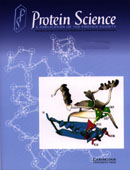Crossref Citations
This article has been cited by the following publications. This list is generated based on data provided by
Crossref.
Serrano, Luis
2000.
Protein folding mechanisms.
Vol. 53,
Issue. ,
p.
49.
Sun, Jia Ke
Penel, Simon
and
Doig, Andrew J.
2000.
Determination of α‐helix N1 energies after addition of N1, N2, and N3 preferences to helix/coil theory.
Protein Science,
Vol. 9,
Issue. 4,
p.
750.
Penel, Simon
and
Doig, Andrew J
2001.
Rotamer strain energy in protein helices - quantification of a major force opposing protein folding
.
Journal of Molecular Biology,
Vol. 305,
Issue. 4,
p.
961.
Cochran, Duncan A.E.
Penel, Simon
and
Doig, Andrew J.
2001.
Effect of the N1 residue on the stability of the α‐helix for all 20 amino acids.
Protein Science,
Vol. 10,
Issue. 3,
p.
463.
Altschuler, E.L.
2001.
Alpha helix capping and the conformation of threonine.
Medical Hypotheses,
Vol. 56,
Issue. 4,
p.
478.
Cochran, Duncan A.E.
and
Doig, Andrew J.
2001.
Effect of the N2 residue on the stability of the α‐helix for all 20 amino acids.
Protein Science,
Vol. 10,
Issue. 7,
p.
1305.
Wilson, Claire L.
Hubbard, Simon J.
and
Doig, Andrew J.
2002.
A critical assessment of the secondary structure α-helices and their termini in proteins.
Protein Engineering, Design and Selection,
Vol. 15,
Issue. 7,
p.
545.
Petukhov, Michael
Uegaki, Koichi
Yumoto, Noboru
and
Serrano, Luis
2002.
Amino acid intrinsic α‐helical propensities III: Positional dependence at several positions of C terminus.
Protein Science,
Vol. 11,
Issue. 4,
p.
766.
Moret, M.A.
Bisch, P.M.
Mundim, K.C.
and
Pascutti, P.G.
2002.
New Stochastic Strategy to Analyze Helix Folding.
Biophysical Journal,
Vol. 82,
Issue. 3,
p.
1123.
Doig, Andrew J
2002.
Recent advances in helix–coil theory.
Biophysical Chemistry,
Vol. 101-102,
Issue. ,
p.
281.
Kemp, Daniel S.
2002.
Construction and Analysis of LifsonRoig Models for the Helical Conformations of α‐Peptides.
Helvetica Chimica Acta,
Vol. 85,
Issue. 12,
p.
4392.
Zhang, Wuming
Loughran, Micheal G.
Kanna, Shin‐ichi
Yano, Kazuyoshi
Ikebukuro, Kazunori
Yokobayashi, Yohei
Kuroda, Reiko
and
Karube, Isao
2003.
Exploration of structural features of monomeric helical peptides designed with a genetic algorithm.
Proteins: Structure, Function, and Bioinformatics,
Vol. 53,
Issue. 2,
p.
193.
Iqbalsyah, Teuku M.
and
Doig, Andrew J.
2004.
Effect of the N3 residue on the stability of the α‐helix.
Protein Science,
Vol. 13,
Issue. 1,
p.
32.
Wilson, Claire L.
Boardman, Paul E.
Doig, Andrew J.
and
Hubbard, Simon J.
2004.
Improved prediction for N‐termini of α‐helices using empirical information.
Proteins: Structure, Function, and Bioinformatics,
Vol. 57,
Issue. 2,
p.
322.
Doig, Andrew J.
Errington, Neil
and
Iqbalsyah, Teuku M.
2005.
Protein Folding Handbook.
p.
247.
Dannenberg, J.J.
2005.
Peptide Solvation and H‐Bonds.
Vol. 72,
Issue. ,
p.
227.
Moret, M.A.
Bisch, P.M.
Nogueira Jr., E.
and
Pascutti, P.G.
2005.
Stochastic strategy to analyze protein folding.
Physica A: Statistical Mechanics and its Applications,
Vol. 353,
Issue. ,
p.
353.
Inai, Yoshihito
Ousaka, Naoki
and
Miwa, Yoichi
2006.
Theoretical Comparison between Three-Point and Two-Point Binding Modes for Chiral Discrimination upon the N-Terminal Sequence of 310-Helix.
Polymer Journal,
Vol. 38,
Issue. 5,
p.
432.
Hong, Liu
and
Lei, Jinzhi
2008.
Statistical mechanical model for helix-sheet-coil transitions in homopolypeptides.
Physical Review E,
Vol. 78,
Issue. 5,
Fonseca, Nuno A.
Camacho, Rui
and
Magalhães, A. L.
2008.
Amino acid pairing at the N‐ and C‐termini of helical segments in proteins.
Proteins: Structure, Function, and Bioinformatics,
Vol. 70,
Issue. 1,
p.
188.

